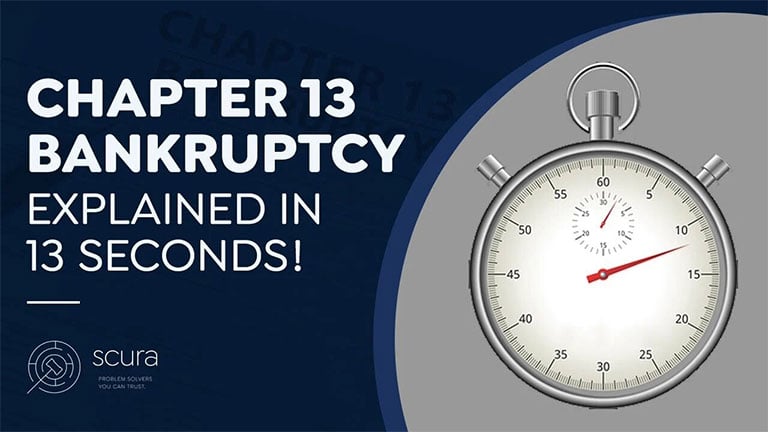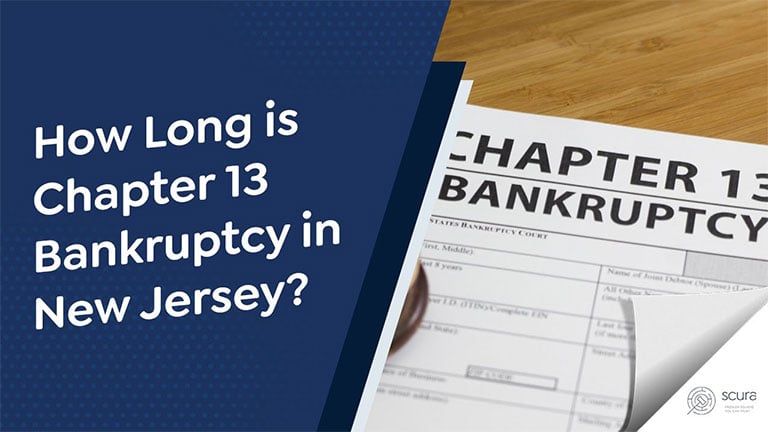NJ Chapter 13 Bankruptcy
About Chapter 13 Bankruptcy in New Jersey
Chapter 13 bankruptcy is often the best choice of debt relief for individuals and families who don't qualify under another bankruptcy chapter or would be unable to completely eliminate their unsecured debt under the new bankruptcy laws of 2005. Chapter 13 bankruptcy can also be an excellent way to prevent foreclosure and repossession while restructuring your monthly debt payments into a supervised installment agreement. By filing Chapter 13, you may be able to:
- Eliminate much of your credit card debt and restructure remaining payments
- Keep equity in your house and prevent mortgage foreclosure
- Keep your car
- Stop wage garnishment and tax liens
What is Chapter 13 Bankruptcy?
In a Chapter 13 bankruptcy case, the debtor puts forward a plan, following the rules set forth in the bankruptcy laws, to repay all creditors over a period of time, usually from future income.
Most Chapter 13 cases are used by a person looking to save a home or real estate in a foreclosure. It gives the debtor the opportunity to either sell the home or become caught up on mortgage payments that have fallen behind. A person filing a Chapter 13 can propose a 60-month plan to cure or become current on mortgage payments. For instance, if you fell behind on $60,000 worth of mortgage payments, you could propose a plan of $1,000 a month for 60 months to bring those mortgage payments current.
In addition, in a Chapter 13 repayment plan, if you have high credit card debt and are behind on mortgage payments, depending upon your plan you may be able to pay only 5% to outstanding credit cards.
For example, if you owe $100,000 in credit card debt, you may be able to pay only $5,000 over a 60-month plan depending upon your situation. There are also trustee's commissions that can be easily calculated depending upon your plan payment. Our firm will even agree to take a portion of its legal fee through the plan of reorganization.
A Chapter 13 case may be advantageous in that the debtor is allowed to get caught up on mortgages or car loans without the threat of foreclosure or repossession and is allowed to keep both exempt and nonexempt property. The debtor's plan is a document outlining to the bankruptcy court how the debtor proposes to pay current expenses while paying off all the old debt balances.
The debtor's property is protected from seizure from creditors, including mortgage and other lien holders, as long as the proposed payments are made. The plan generally requires monthly payments to the bankruptcy trustee over a period of three to five years. Arrangements can be made to have these payments made automatically through payroll deductions.
New Jersey Chapter 13 Bankruptcy Rules, Laws and Alternatives
To help you to learn more about bankruptcy, the New Jersey bankruptcy attorneys at Scura, Wigfield, Heyer, Stevens Cammarota, LLP, created the following articles that explain chapter 13 bankruptcy, as well the rules, process and options regarding bankruptcy. For a free consultation regarding your specific situation contact us today.
General Chapter 13 NJ Bankruptcy Information
- Chapter 13 Bankruptcy FAQs – learn the basics of the bankruptcy code
- Best Time To File Bankruptcy
- What filing for chapter 13 bankruptcy can and cannot do for you
- Fair Debt Collection Practices Act Prevents Debt Collection Agencies from Taking Certain Actions -
- What is the Waiting Time Between Multiple Bankruptcy Filings?
- Tax Returns Must Be Filed by Chapter 7 and Chapter 13 Bankruptcy Debtors.
- How to Improve Credit After Bankruptcy
Chapter 13 New Jersey Bankruptcy Keeping Your Home
- How to stop Foreclosure Filings - There are various options if you are in foreclosure, including a chapter 11, chapter 13 or chapter 7 bankruptcy which you may be eligible to reorganize or wipe out certain types of debt and save your home.
- Automatic Stay in Bankruptcy - One of the most basic benefits of a bankruptcy is that when you file for bankruptcy, something called the automatic stay immediately stops any lawsuit filed against you and most actions against your property by a creditor, collection agency, or government entity.
- Obtaining Protection from a Foreclosure or Sheriff Sale with the Automatic Stay - A bankruptcy is a powerful tool to stop a mortgage foreclosure. With a chapter 13 or 11 bankruptcy, a person can restructure the amount behind on the loan and pay off the arrears over time.
- Important Reasons for Filing a Chapter 13 Bankruptcy Before a Sheriff Sale - Learn why if a debtor or consumer waits until after the sheriff sale, they will in all likelihood lose their property.
- Short Sales and Deeds in Lieu of Foreclosure - A short sale or deed in lieu of foreclosure may allow you to sell your home or give back the deed to the bank or mortgage company in order to avoid a deficiency judgment.
- Chapter 13 Bankruptcy Strip Off or Cram Down Strategy In Decreasing Home Value Market
Chapter 13 Bankruptcy Other Property
- Restructuring Loans with Secured Creditors - Unlike a chapter 7, in chapter 13 bankruptcy proceedings, you can take the amount you have fallen behind, such as on a house or car, and pay that arrearage amount over the life of a 60 month or five year plan
- Creditors must return repossessed property, such as a car, even after the repo has occurred upon the filing of the bankruptcy.
- Cramming Down or Strip Off a Second Mortgage, Third Mortgage or More on real estate that is worth less than the amount of the first mortgage in a Chapter 13 bankruptcy and wipe it out.
Tax Debt Bankruptcy in NJ
- Wiping Out or Discharging IRS Tax Debts in Bankruptcy - Contrary to popular belief, you can wipe out certain types of IRS debt obligations.
- Calculating the Three (3) Year Time Period for Discharging Taxes in Bankruptcy - You have to wait 3 years after the tax return was due before you can file bankruptcy in order to be eligible to wipe out the tax debt.
The New Jersey bankruptcy law firm of Scura, Wigfield, Heyer Stevens, LLP, with offices in Wayne and Hoboken has been serving the legal needs of residents and businesses throughout the Hoboken metro region and eastern New Jersey since 1972.
Contact us at 973-870-0434 or schedule a FREE initial consultation about your Chapter 13 bankruptcy today.
We are a debt relief agency. We help people file for bankruptcy relief under the Bankruptcy Code.





